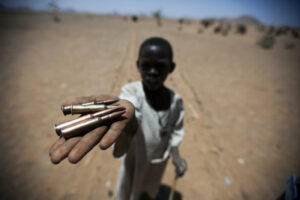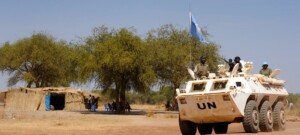UN’s Guterres: ‘Rape remains prevalent in less dangerous Darfur’
Sexual violence remains prevalent in the Darfur region, while the rate of displacement was lower in 2017 than in previous years, said the UN secretary-general in a report. The area is “awash with small arms and light weapons, criminality and sporadic clashes”.
 Soldiers walk past women in Tabit in North Darfur, on November 20, 2014. Sudan's special prosecutor visited the town to investigate claims of mass rape (Reuters)
Soldiers walk past women in Tabit in North Darfur, on November 20, 2014. Sudan's special prosecutor visited the town to investigate claims of mass rape (Reuters)
Sexual violence remains prevalent in the Darfur region, while the rate of displacement was lower in 2017 than in previous years, said the UN secretary-general in a report. The area is “awash with small arms and light weapons, criminality and sporadic clashes”.
In his report on the worldwide conflict-related sexual violence in 2017, United Nations Secretary-General António Guterres highlighted the situation in Darfur and praised the weapons collection campaign that took place in Darfur. He pointed to the decline of tribal clashes and the significant reduction of clashes between the government forces and rebel groups.
Humanitarian access had improved and this year, the rate of new displacement was lower than in previous years, the UN Secretary-General said in his report to the Security Council on Monday. The African Union-UN Mission in Darfur (Unamid), however, reported 152 cases of rape, affecting 84 women, 66 girls and 2 boys, across the five states of Darfur throughout 2017.
“The cases involved rape (90 per cent), attempted rape (6 per cent) and gang rape (4 per cent). In 2 per cent of cases, the victims were killed and, in many others, suffered grievous bodily harm,” the report said. 70 per cent of the rape cases are perpetrated by “armed men or militia members in civilian attire”, while the remaining 30 per cent are committed by the government’s regular forces the Sudan Armed Forces (SAF), and the government’s main militia forces the Rapid Support Forces (RSF) and Border Guards.
Stigma on reporting rape
Guterres underlined a decrease from the 222 victims in 2016. However: “Sexual violence continues to be chronically underreported due to stigma, harassment, trauma, the lack of protection afforded to victims and witnesses and the perceived inaction of law enforcement, with police and service providers alike having been pressured to drop cases. Rape is often resolved through traditional justice mechanisms, which tend to order victims to marry the perpetrator.”
The Secretary-General continues that although article 149 of the Sudanese Criminal Act (1991) was amended in 2015 to define rape “in a manner more consistent with international standards, in practice, victims continue to fear that a failure to prove rape may expose them to being charged with adultery, a situation that perpetuates the reluctance of survivors to report”.
The sexual violence cases mentioned by the report have primarily occurred around camps for displaced people, but has also been noted by Unamid and researchers in villages and remote areas to which displaced people have begun to return.
“Perpetrators typically prey upon victims when they are engaged in livelihood activities. In some cases, security fears have forestalled the return of civilians to their villages of origin. In one incident, a family living in West Darfur, which had previously fled to Chad as refugees, were forced back across the border into Chad after a relative was gang-raped, for fear of further attacks.”
'The rape of minors, especially girls, is on the rise. The highest rate is recorded in South Darfur.' – UN Secretary-General Antonio Guterres
Data the Darfur Special Prosecutor for Crimes had compiled for the report, indicated that the rape of minors – especially girls – is on the rise. The highest rate of child rape is recorded in South Darfur (58 per cent). Of 286 cases of rape of minors that were reported in 2017, only 86 cases have been adjudicated. “Although in the view of the Special Prosecutor, none of those cases constituted conflict-related sexual violence.”
Previous years
In 2015, the African Union-United Nations Mission in Darfur (Unamid) peacekeeping mission documented 80 cases of conflict-related sexual violence in the limited areas the mission staff could access. In October 2014, during a three-day attack by government forces on the town of Tabit, Human Rights Watch documented credible evidence that 221 women and girls were raped. Following this attack, Unamid was not allowed to access the area for weeks, and then only in the presence of Sudanese government officials. There has been no evidence that the survivors of the attacks have received necessary medical and psycho-social services, and there are continuing concerns for the victims' security.
According to the African Center for Justice and Peace Studies (ACJPS), the amendments to the definition of rape in Article 149 in Sudan’s criminal law have kept the legislation unclear about evidence standards that apply. Lawyer Amal El Zein, specialised in the rights of woman and children, urged the Sudanese government to review the law and provisions concerning rape. “There is a clear defect in the law text of Article 149, which lacks a severe punishment against the offender,” she told Radio Dabanga.











 and then
and then